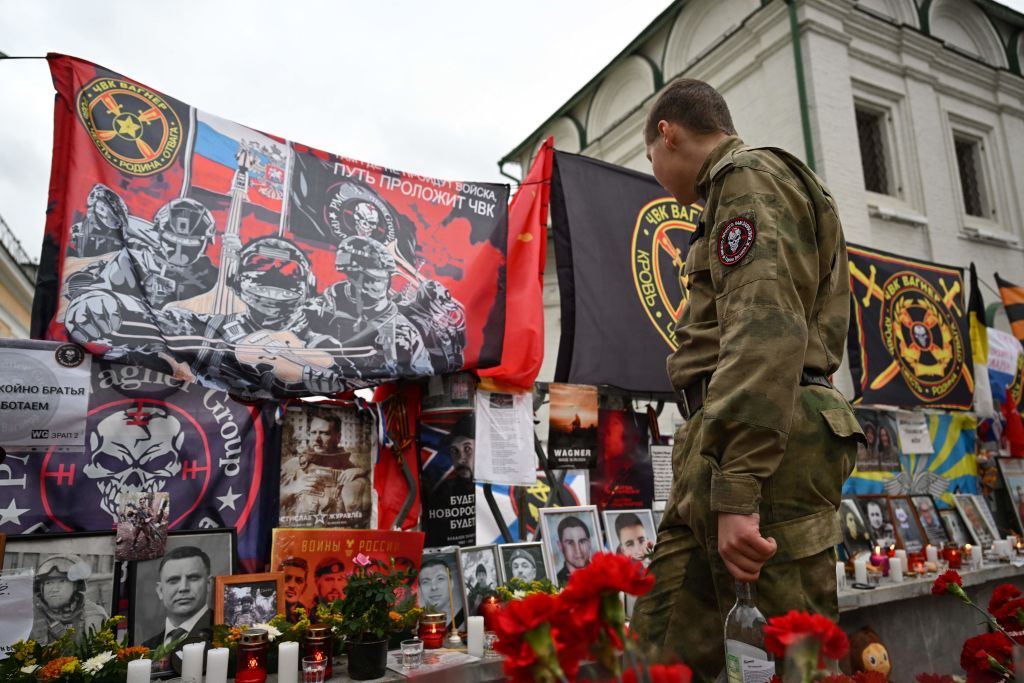A year has passed since Wagner mercenary boss Yevgeny Prigozhin died in a plane crash. His demise was entirely predictable, coming weeks after he led his army of convict soldiers in an uprising that constituted the most significant challenge to Russian President Vladimir Putin’s decades-long rule. Perhaps the only enduring mysteries are why Prigozhin was permitted to live as long as he did and why anyone willingly boarded a plane with him.
Indeed, Prigozhin was not alone when he died; the incident led to the deaths of several senior Wagner commanders too. However, Putin had started dismantling the Wagner Group even before he dismantled Prigozhin. In the days after the revolt, it was decided behind closed doors at the Kremlin that the FSB internal security agency would take over Prigozhin’s domestic commercial enterprises, the SVR (foreign intelligence service) would receive his communications businesses, and the foreign military components would go to the GRU (military intelligence).
Within the GRU, a Volunteer Corps would cover Ukraine, with other private military companies recruiting Wagner fighters and then bringing them under the overall auspices of the Defence Ministry. There would also be an Expeditionary Corps for activities further afield. In reality, it was not quite as simple as that: Prigozhin’s son Pavel tried to offer Wagner to the Rosgvardiya, or National Guard, in a move that was partially approved and so sparked a bidding war for commanders. Some ex-Wagner mercenaries have been traced to the Rosgvardiya and Chechen Akhmat forces.
Even before the revolt, tensions had been ratcheting on the front line in Ukraine between Wagner mercenaries and the Russian army, raising the question of how guns for hire peacefully integrated alongside soldiers they had once kidnapped and tortured. Prigozhin’s death was followed by a requirement that private military companies pledge allegiance to the Russian state, while US intelligence briefed that Wagner fighters had been warned that non-compliance would bring harsh reprisals. Besides, once the group’s leaders were killed no figurehead emerged for any remaining mutinous elements to get behind.
The Expeditionary Corps was taken over by the GRU’s General Andrei Averyanov, known for having headed Unit 29155, an operation specialising in assassinations and destabilising foreign governments. The new role constituted a change of pace for Averyanov, switching from subverting governments to steadying them. Wagner had long proven a key tool of Kremlin diplomacy, offering foreign regimes security in return for lucrative mining rights. Prigozhin’s revolt had been followed by whistle-stop ministerial tours of Middle Eastern and African capitals to reassure skittish dictators that they could still turn to Russia for all their rebellion-quashing needs.
Last November, Africa Corps appeared on Telegram, describing itself as “part of a special structure of the Ministry of Defence”. Situated within the Expeditionary Corps, US Government sources said this Africa unit was absorbing Wagner activities and staff on the continent. The process includes a rebranding and re-signing of contracts with the Russian Defence Ministry, along with some management changes, with a few old Wagner traditions and insignia allowed. In February, Russian Government documents revealed “regime survival packages” still being offered in return for natural resources.
However, there have been setbacks: Ukrainian forces have taken the fight to those mercenaries who once forced them from such cities as Bakhmut and Soledar. Last month, an ambush in Mali claimed the lives of 47 local soldiers and 84 Russian mercenaries. Ukrainian military intelligence confirmed that Tuareg rebels had “received necessary information, and not just information, which enabled a successful military operation against Russian war criminals”. Reports indicated that Kyiv’s special forces had trained separatists to use attack drones. With Moscow prioritising African ties to circumvent the West’s sanctions and diplomatic isolation, the attack was not only embarrassing but damaging, as local leaders were forced to reconsider the value of Moscow’s mercenaries.
Shortly before his death, Prigozhin stressed that Wagner’s Africa operations would continue. He must have known it would be without him. Yet, with his passing, Wagner lost not only its figurehead but a great deal of its potency.











Join the discussion
Join like minded readers that support our journalism by becoming a paid subscriber
To join the discussion in the comments, become a paid subscriber.
Join like minded readers that support our journalism, read unlimited articles and enjoy other subscriber-only benefits.
Subscribe